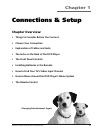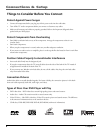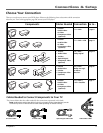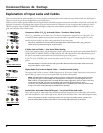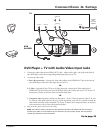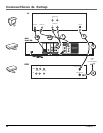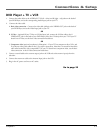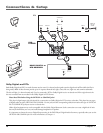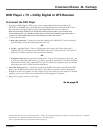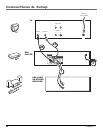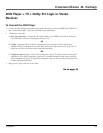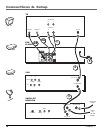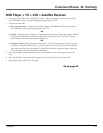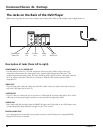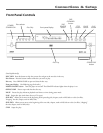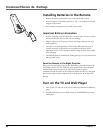
Chapter 1 13
Connections & Setup
Manufactured under license from Dolby Laboratories. “Dolby” and the double-D symbol are trademarks of Dolby Laboratories. Confidential
unpublished works. ©1992-1997 Dolby Laboratories, Inc. All rights reserved.
DTS is a registered trademark of Digital Home Theater Systems, Inc.
DVD Player + TV + Dolby Digital or DTS Receiver
To Connect the DVD Player
1. If you have a Dolby Digital or DTS receiver, insert an optical digital cable (not provided) to the
OPTICAL or COAXIAL jack on the DVD player to the Digital Input jack on the back of the receiver.
You must also set the Digital Output setting in the Digital Audio Out menu (see chapter 4).
Note: The connection illustration on the left shows a digital optical cable. If your receiver has a
coaxial AUDIO IN jack, use a shielded (coaxial) video or audio cable with RCA plugs at both ends to
connect the coaxial digital audio jacks on the DVD player and the A/V receiver.
2. Connect the video cable.
A. Basic video connection – Connect the video cable (yellow) to the VIDEO OUT jack on the back of
your DVD Player, and to the Video Input jack on your TV.
OR
B. S-Video – (optional) If your TV has an S-Video Input jack, connect the S-Video cable to the S-
VIDEO OUT jack on the back of your DVD Player and to the S-Video jack on your TV. If your TV
doesn’t have S-Video, use the basic video connection listed above.
OR
C. Component video (optional, not shown in illustration) – If your TV has component video (Y, P
B
, and
P
R
jacks)
use video-grade cables for the Y, P
B
, and P
R
connections. Note that it is essential to match the
color coded connectors with a compatible TV. If your TV doesn’t have component video, use the basic
video connection or the S-Video connection listed above.
3. Down Mix Audio (optional) – Connect the second set of AUDIO OUT jacks on the back of the DVD
player to the AUDIO IN jacks on the back of the TV. This allows you to listen to discs without going
through the receiver. For example, if it’s late at night and you want to listen to a disc without 5.1-channel
sound on, you can turn off the receiver and listen to the disc through the TV speakers.
4. Plug in the AC power cord into an AC outlet.
Go to page 20



